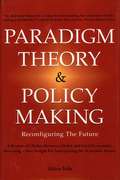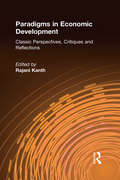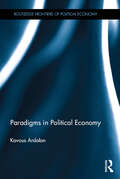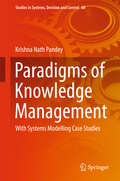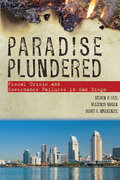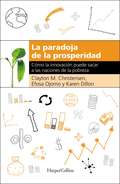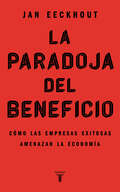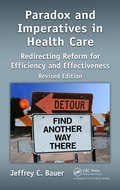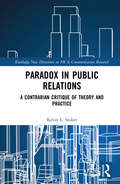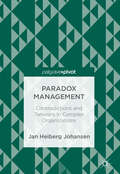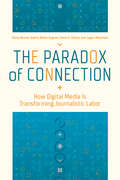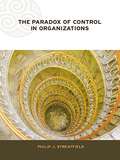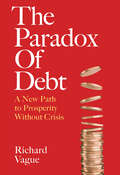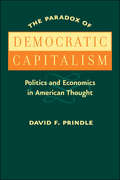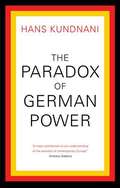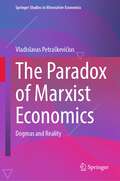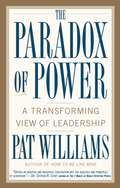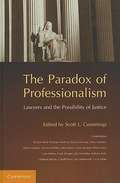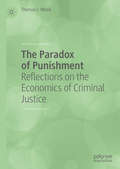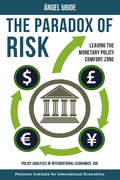- Table View
- List View
Paradigm Theory & Policy Making
by Akira Iida"An alternative framework of ideas for understanding the complexity of policy making in the fast lane." --John H. McArthur, Dean Emeritus, Harvard Business School.A review of clashes between global and local economics, reveals a new insight for anticipating the economic future.Paradigm Theory and Policy Making is a wide-ranging and thought-provoking treatise on the forces that have shaped the political economies of the developed and developing world since World War II. The author--a vastly experienced policy maker, nationally and internationally—takes us on a journey that encompasses not just economics but political science, sociology, philosophy and cultural studies as he presents an alternative framework to conventional academic ideas.Along the way, he provides a critical evaluation of theories that have dominated economic thought in the last 50 years and highlights the dangers of a blanket application of such theories without taking into account the "real-world" practicalities confronted by nation states in a globalizing world.Topics include: The Conceptual Framework of the Paradigm Theory Civilization, Culture and the Paradigm of Political Economy American Values and the Paradigm of Political Economy The Post-Terror Paradigm Developing Economies and the Paradigm of Political Economy A reflection on "Innocence and Design"
Paradigma der digitalen und multioptionalen Bildung: Ein sozio-ökonomisches Konstrukt der Belastungs-Beanspruchungs-Interiorisation des familien- und berufsbegleitenden Weiterbildungsstudiums (Schriften der Kalaidos Hochschule)
by Maika LangeIn diesem Buch wird untersucht, wie die Digitale Multioptionale Bildung gestaltet werden muss, um innerhalb eines familien- und berufsbegleitenden Weiterbildungsprogramms akademische Erolge zu erzielen.Dabei werden sowohl die Studierenden als auch die Hochschule berücksichtigt. Digitale Multioptionale Bildung ist als eine ganzheitliche Bildung zu verstehen in einem familien- und berufsbegleitenden Weiterbildungsprogramm, mit Gestaltungsmöglichkeiten unter Berücksichtigung der eigenen individuellen Leistungsanforderungen. Digitale Bildung wird hierbei als technologiegestützter Prozess innerhalb dieser Arbeit verstanden. Es werden vier Handlungsfelder hervorgehoben. 1.) Ein Konstrukt und seine Dimensionen innerhalb der digitalen, multioptionalen Bildung definiert werden. 2.) Ein Konzept von Stress und Belastung in Bezug auf Digitale Multioptionale Bildung soll entwickelt werden. 3.) Bedürfnisse von Studierenden und Hochschulen im sozioökonomischen Konstrukt sind zu ermitteln. 4.) Handlungsempfehlungen zur Digitalen Multioptionalen Bildung werden abgeleitet, basierend auf der sozioökonomischen Betrachtung innerhalb des Belastungs- und Beanspruchungskonzeptes.
Paradigms in Economic Development: Classic Perspectives, Critiques and Reflections
by Rajani K. KanthPresents an introduction to East Asian politics. This book uses a thematic approach to describe the political development of China, Japan, and Koreas since the mid-nineteenth century and analyzes the social, cultural, political, and economic features of each country.
Paradigms in Political Economy (Routledge Frontiers of Political Economy)
by Kavous ArdalanSocial theory can usefully be conceived in terms of four key paradigms: functionalist, interpretive, radical humanist, and radical structuralist. The four paradigms are founded upon different assumptions about the nature of social science and the nature of society. Each generates theories, concepts, and analytical tools which are different from those of other paradigms and together they provide a more balanced understanding of the phenomenon under consideration. This book demonstrates that an understanding of these different paradigms and how they can be applied leads to a better understanding of the multi-faceted nature of political economy. Any explanation of a given phenomenon is based on a worldview. The premise of this book is that any worldview can be associated with one of the four key paradigms. Each chapter of the book takes an important phenomenon (i.e., the state, justice, freedom, democracy, liberal democracy, media, and the great recession) and discusses it from the four different viewpoints. It emphasizes that the four views expressed are equally scientific and informative. They look at the phenomenon from their certain paradigmatic perspective and together provide a more balanced understanding of the phenomenon under consideration. The diversity of economics research possibilities referred to in this book is vast. While each paradigm advocates a research strategy that is logically coherent, in terms of underlying assumptions, these vary from paradigm to paradigm. The phenomenon to be researched can be conceptualized and studied in many different ways, each generating distinctive kinds of insight and understanding. This book is for those who study political economy as well as economic theory and philosophy.
Paradigms of Knowledge Management
by Krishna Nath Nath PandeyThis book has been written by studying the knowledge management implementation at POWERGRID India, one of the largest power distribution companies in the world. The patterns which have led to models, both hypothesized and data-enabled, have been provided. The book suggests ways and means to follow for knowledge management implementation, especially for organizations with multiple business verticals to follow. The book underlines that knowledge is both an entity and organizational asset which can be managed. A holistic view of knowledge management implementation has been provided. It also emphasizes the phenomenological importance of human resource parameters as compared to that of technological parameters. Various hypotheses have been tested to validate the significant models hypothesized. This work will prove useful to corporations, researchers, and independent professionals working to study or implement knowledge management paradigms.
Paradise for Sale: A Parable of Nature
by Carl N. Mcdaniel John M. GowdyThe grim history of Nauru Island, a small speck in the Pacific Ocean halfway between Hawaii and Australia, represents a larger story of environmental degradation and economic dysfunction. For more than 2,000 years traditional Nauruans, isolated from the rest of the world, lived in social and ecological stability.
Paradise Plundered: Fiscal Crisis and Governance Failures in San Diego
by Scott A. Mackenzie Vladimir Kogan Steven P. ErieThe early 21st century has not been kind to California's reputation for good government. But the Golden State's governance flaws reflect worrisome national trends with origins in the 1970s and 1980s. Growing voter distrust with government, a demand for services but not taxes to pay for them, a sharp decline in enlightened leadership and effective civic watchdogs, and dysfunctional political institutions have all contributed to the current governance malaise. Until recently, San Diego, California-America's 8th largest city-seemed immune to such systematic governance disorders. This sunny beach town entered the 1990s proclaiming to be "America's Finest City," but in a few short years its reputation went from "Futureville" to "Enron-by-the-Sea. " In this eye-opening and telling narrative, Steven P. Erie, Vladimir Kogan, and Scott A. MacKenzie mix policy analysis, political theory, and history to explore and explain the unintended but largely predictable failures of governance in San Diego. Using untapped primary sources-interviews with key decision makers and public documents-and benchmarking San Diego with other leading California cities,Paradise Plunderedexamines critical dimensions of San Diego's governance failure: a multi-billion dollar pension deficit; a chronic budget deficit; inadequate city services and infrastructure; grandiose planning initiatives divorced from dire fiscal realities; an insulated downtown redevelopment program plagued by poorly-crafted public-private partnerships; and, for the metropolitan region, inadequate airport and port facilities, a severe underinvestment in firefighting capacity despite destructive wildfires, and heightened Mexican border security concerns. Far from a sunny story of paradise and prosperity, this account takes stock of an important but understudied city, its failed civic leadership, and poorly performing institutions, policymaking, and planning. Though the extent of these failures may place San Diego in a league of its own, other cities are experiencing similar challenges and political changes. As such, this tale of civic woe offers valuable lessons for urban scholars, practitioners, and general readers concerned about the future of their own cities.
La paradoja de la prosperidad
by Clayton M. Christensen Efosa Ojomo Karen DillonLa pobreza global es uno de los problemas más grandes del mundo. Desde la educación hasta la atención médica, la infraestructura para erradicar la corrupción, se han ofrecido demasiadas soluciones, pero que se basan en ensayo y error. Esencialmente, el plan a menudo es identificar áreas que necesitan ayuda, inundarlas de recursos y esperar ver cambios a lo largo del tiempo.Pero la esperanza no es una estrategia efectiva. ¿Cómo es posible que naciones que reciben millones de dólares en ayuda sigan siendo pobres? Christensen sugiere una mejor manera. El tipo correcto de innovación no solo construye empresas, sino que también construye países. La Paradoja de la Prosperidad identifica los límites de los modelos comunes de desarrollo económico, que tienden a ser esfuerzos de arriba hacia abajo, y ofrece un nuevo marco para el crecimiento económico basado en el espíritu empresarial y la innovación de creación de mercado, para analizar países como Japón, Corea del Sur, Nigeria, Ruanda, India, Argentina... y México.
La paradoja de la prosperidad: Como la innovación puede sacar a las naciones de la pobreza
by Clayton M. Christensen Efosa Ojomo Karen DillonLa pobreza global es uno de los problemas más grandes del mundo. Desde la educación hasta la atención médica, la infraestructura para erradicar la corrupción, se han ofrecido demasiadas soluciones, pero que se basan en ensayo y error. Esencialmente, el plan a menudo es identificar áreas que necesitan ayuda, inundarlas de recursos y esperar ver cambios a lo largo del tiempo.Pero la esperanza no es una estrategia efectiva. ¿Cómo es posible que naciones que reciben millones de dólares en ayuda sigan siendo pobres?Christensen sugiere una mejor manera. El tipo correcto de innovación no solo construye empresas, sino que también construye países. La Paradoja de la Prosperidad identifica los límites de los modelos comunes de desarrollo económico, que tienden a ser esfuerzos de arriba hacia abajo, y ofrece un nuevo marco para el crecimiento económico basado en el espíritu empresarial y la innovación de creación de mercado, para analizar países como Japón, Corea del Sur, Nigeria, Ruanda, India, Argentina... y México.The Prosperity ParadoxGlobal poverty is one of the world&’s most vexing problems. For decades, we&’ve assumed smart, well-intentioned people will eventually be able to change the economic trajectory of poor countries. From education to healthcare, infrastructure to eradicating corruption, too many solutions rely on trial and error. Essentially, the plan is often to identify areas that need help, flood them with resources, and hope to see change over time.But hope is not an effective strategy. How is it possible for nations that receive millions of dollars in aid to remain poor?Christensen suggests a better way. The right kind of innovation not only builds companies, but also builds countries. The Prosperity Paradox identifies the limits of common models of economic development, which tend to be top-down efforts, and offers a new framework for economic growth based on entrepreneurship and market-making innovation, to analyze countries like Japan, South Korea, Nigeria, Rwanda, India, Argentina... and Mexico.
La paradoja del beneficio: Cómo las empresas exitosas amenazan la economía
by Jan EeckhoutUn manifiesto para nuestro tiempo de la mano de un autor referente en el estudio de las relaciones entre mercado y trabajadores. Hay quien piensa que, dado que vivimos en una época de avances tecnológicos sin precedentes, los trabajadores nunca han disfrutado de mejores condiciones laborales. Pero la realidad es que los salarios se han estancado mientras el coste de la vida no deja de aumentar. En los últimos cuarenta años, un puñado de empresas ha cosechado la mayor parte de los beneficios derivados de ese progreso y, en lugar de trasladar las ventajas de esos avances a los consumidores reduciendo los precios, estos han subido, lo que ha contribuido a incrementar la desigualdad y a frenar la movilidad social. Basándose en su propia e innovadora investigación y relatando historias de empleados comunes, Jan Eeckhout demuestra cómo el poder de una economía controlada por empresas «superestrellas» ha asfixiado el mercado laboral y cómo, sin mejores mecanismos para garantizar la competencia, este sistema nos aboca a desastrosas consecuencias, tanto económicas como sociales y políticas. La paradoja del beneficio es un estudio provocador, pero también una interesante propuesta de soluciones para restaurar una economía más sana. La crítica ha dicho:«Un libro excelente, con fundamentos que avalan el rigor, la ampliación del análisis coexiste con una admirable facilidad divulgadora. En sus numerosos e ilustrativos ejemplos aporta pruebas suficientes del poder de mercado que se ejerce en nuestros días».Emilio Ontiveros, El País «Una tesis agudamente argumentada de que uno de los efectos del dominio de las corporaciones todopoderosas es la reducción de los salarios de los trabajadores en general. Un caso provocador, que seguramente apreciarán quienes se sientan infravalorados en la economía actual».Kirkus Reviews «Eeckhout ha realizado un trabajo pionero sobre el aumento de los precios en la economía y la dinámica del mercado laboral. Este libro es una importante contribución a este campo de investigación».Gabriel Zucman, coautor de El triunfo de la injusticia «Un relato vívido y exhaustivo de las causas y consecuencias del reciente aumento del poder de mercado, escrito por un experto de renombre mundial. Combina una profunda visión económica con ejemplos de la vida cotidiana que cautivarán tanto al público no especializado como a los economistas».Pinelopi Goldberg, economista jefe del Grupo del Banco Mundial entre 2018 y 2020 «Eeckhout documenta un asombroso aumento del poder de mercado en todo tipo de sectores desde 1980. No estamos hablando solo de los sospechosos habituales. Estamos hablando de todo, desde los fabricantes de comida para gatos hasta los vendedores de ataúdes».Greg Rosalsky, Planet Money, NPR
Paradox and Imperatives in Health Care: Redirecting Reform for Efficiency and Effectiveness, Revised Edition
by Jeffrey C. Bauer Drummer Steven B. OlafThe Paradox: Americans are not as healthy as people in dozens of comparable countries that spend 30 percent less on health care, and our medical marketplace overall is plagued by persistent problems of cost, quality, and access. Yet, the worlds best individual health systems are located in the U.S.each a unique result of visionary leadership and
Paradox in Public Relations: A Contrarian Critique of Theory and Practice (Routledge New Directions in PR & Communication Research)
by Kevin L. StokerParadox in Public Relations: A Contrarian Critique of Theory and Practice is a thought-provoking exploration of public relations, aiming to promote changes in meaning and perception by creating new meta-realities for public relations. The term “Public Relations” was embraced by early practitioners primarily because it sounded more professional than the often-pejorative alternatives. This book argues for a reframing of some of the popular realities associated with modern-day public relations and uses psychological and organizational change theory to critique paradoxes in public relations theory and practice. By examining public relations through the lens of paradox, we can begin to identify the logical fallacies that have inhibited progress and innovation in public relations practice and theory. The book explores the paradoxical nature of key concepts, including public interest, relationship management, accountability, stewardship, loyalty, community, and ethics. It also recommends new conceptualizations for understanding the field. This book will be of interest to media, communication, public relations, and advertising faculty and graduate students, particularly those interested in public relations theory and ethics. Scholars from other disciplines can also use this exploration of paradox in PR as a learning tool for identifying logical fallacies and inconsistencies.
Paradox Management: Contradictions and Tensions in Complex Organizations
by Jan Heiberg JohansenParadoxes emerge everywhere in organizational theory and management practice. This book is a theoretically grounded presentation of the strategic and historical context of organizational paradoxes, exploring the paradoxes in organizational management and the available tactics to manage them. Based on 700 academic sources in the paradox literature, it presents paradox management as a nuanced and coherent perspective. In presenting and integrating the vast literature on the subject, it contributes new knowledge on how and why the paradox concept was introduced into management theory, how and why conflicting ideals of management can produce organizational contradictions, and how paradoxes can be managed.
The Paradox of Connection: How Digital Media Is Transforming Journalistic Labor
by Diana Bossio Valérie Bélair-Gagnon Avery E. Holton Logan MolyneuxUsing a framework of online connection and disconnection, The Paradox of Connection examines how journalists’ practices are formed, negotiated, and maintained in dynamic social media environments. The interactions of journalists with the technological, social, and cultural features of online and social media environments have shaped new values and competencies--and the combination of these factors influence online work practices. Merging case studies with analysis, the authors show how the tactics of online connection and disconnection interact with the complex realities of working in today’s media environments. The result is an insightful portrait of fast-changing journalistic practices and their implications for both audiences and professional identities and norms.
The Paradox of Control in Organizations
by Philip StreatfieldBusiness leaders are expected to be 'in control' of the situation in which their businesses find themselves. But how can organizational leaders and managers control matters entirely out of their hands; such as the next action a competitor takes, or the next law a government may pass? In this book, Philip Streatfield reflects on his own experience as a manager to explore the question: who, or what is 'in control' in an organization? Adopting the perspective of complex responsive processes developed in the first two volumes of this series, the author takes self-organization and emergence as central themes in thinking about life in organizations. He focuses on the tension between spontaneously forming patterns of conversation and intentional actions arguing that the order of organizations emerges through a combination of collective interaction and individual intentions. The argument is developed by considering the day-to-day experiences of life in a large pharmaceutical organization, SmithKline Beecham. In today's organization, managers find that they have to live with the paradox of being 'in control' and 'not in control' simultaneously. It is this capacity to live with paradox, and to continue to participate creatively in spite of 'not being in control', that constitutes effective management.
The Paradox of Debt: A New Path to Prosperity Without Crisis
by Richard VagueWhen we talk about debt and its impact on our economy, we almost always mean “government debt.” However, this is only a small part of the picture: individuals, private firms, and households owe trillions, and these private debts are vital to understanding the economy.In this iconoclastic book, Richard Vague examines the assets, liabilities, and incomes of the entire country, private and public sector, to reveal its net worth. His holistic analysis shows that the real factor that drives both financial crises and spiraling inequality—but also, paradoxically, economic growth—is ever rising private debt. The paradox is that while debt is essential and our economy relies on it, it also brings instability unless it is periodically deleveraged—and that is very hard to do. It can, however, be carefully managed, and Vague ends the book by showing how to do so in policy areas ranging from trade and housing to financial policy and student debt.Underpinned by pioneering data analysis and the author’s lifetime of experience in the financial world, this book is essential for anyone who wants to understand the deep, underlying dynamics of the American economy.
The Paradox of Democratic Capitalism: Politics and Economics in American Thought
by David F. PrindleA truly interdisciplinary enterprise, The Paradox of Democratic Capitalism examines the interplay of ideas about politics, economics, and law in American society from the pre-revolutionary era to the eve of the September 11 attacks. David F. Prindle argues that while the United States was founded on liberalism, there is constant tension between two ideals of the liberal tradition: capitalism and democracy. Tracing the rise of natural law doctrine from neoclassical economics, Prindle examines the influence of economic development in late medieval society on the emergence of classical liberalism in early America and likens that influence to the impact of orthodox economics on contemporary American society. Prindle also evaluates political, economic, and legal ideas through the lens of his own beliefs. He warns against the emerging extremes of liberal ideology in contemporary American politics, where the right's definition of capitalism excludes interference from democratic publics and the left's definition of democracy excludes a market-based economy.
The Paradox of German Power
by Hans KundnaniSince the Euro crisis began, Germany has emerged as Europe's dominant power. During the last few years, German Chancellor Angela Merkel has been compared with Bismarck and even Hitler in the European media. And yet few can deny that Germany today is very different from the stereotype of nineteenth- and twentieth-century history. After nearly seventy years of struggling with the Nazi past, Germans believe that they more than anyone have learned its lessons. Above all, what the new Germany aspires to stand for is peace. Germany is unique in this combination of economic assertiveness and military abstinence. So what does it mean to have a "German Europe" in the twenty-first century? In The Paradox of German Power, Hans Kundnani explains how Germany got to where it is now and where it might go in the future. He explores German national identity and foreign policy through a series of tensions in German thinking and action: between continuity and change, between "normality" and "abnormality," between economics and politics, and between Europe and the world. HANS KUNDNANI is Editorial Director at the European Council on Foreign Relations, having previously worked as a journalist for The Guardian, The Observer, Financial Times, Prospect, and the Times Literary Supplement. He is the author of Utopia or Auschwitz: Germany's 1968 Generation and the Holocaust.
The Paradox of Intellectual Property in Capitalism
by João Romeiro HermetoThe Paradox of Intellectual Property in Capitalism is an innovative book that comprehensively discusses and analyses intellectual property under capitalistic social conditions and relations. It not only addresses some historical developments of intellectual property but also brings to the fore the very notion of what knowledge is, knowledge creation, and knowledge production and appropriation within a Marxist framework. Nonetheless, the adopted approach pays heed to multiple fields of knowledge, providing rich discussions that facilitate the understanding of actual social totality in which capitalism, knowledge production and appropriation, and the struggles of appropriation mutually reinforce each other, although not devoid of antagonisms and contradictions. In light of contemporary capitalism, the transformations that social property relations are undergoing must be scrutinised – such as those brought about by the development of digitalisation and the convergence between big pharma and tech giants. What are the conditions of intellectual property creation today? What theoretical assumptions does it make? Under what social relations is intellectual property produced? Throughout, the emphasis is not on individual cases or symptoms but on the overarching logic: the logic of capitalism as revealed in intellectual property.
The Paradox of Islamic Finance: How Shariah Scholars Reconcile Religion and Capitalism
by Ryan CalderHow the booming Islamic finance industry became an ultramodern hybrid of religion and marketsIn just fifty years, Islamic finance has grown from a tiny experiment operated from a Volkswagen van to a thriving global industry worth more than the entire financial sector of India, South America, or Eastern Europe. You can now shop with an Islamic credit card, invest in Islamic bonds, and buy Islamic derivatives. But how has this spectacular growth been possible, given Islam&’s strictures against interest? In The Paradox of Islamic Finance, Ryan Calder examines the Islamic finance boom, arguing that shariah scholars—experts in Islamic law who certify financial products as truly Islamic—have made the industry a profitable, if controversial, hybrid of religion and markets.Critics say Islamic finance merely reproduces conventional interest-based finance, with the shariah scholars&’ blessing. From an economic perspective, they are right: the most popular Islamic products act like conventional interest-bearing ones, earning healthy profits for Islamic banks and global financial heavyweights like Deutsche Bank and Goldman Sachs. Yet as Calder shows by delving into the shariah scholars&’ day-to-day work, what seem like high-tech work-arounds to outsiders carry deep and nuanced meaning to the scholars—and to the hundreds of millions of Muslims who respect their expertise. He argues that shariah scholars&’ conception of Islamic finance is perfectly suited to the age of financialization and the global efflorescence of shariah-minded Islam.
The Paradox of Marxist Economics: Dogmas and Reality (Springer Studies in Alternative Economics)
by Vladislavas PetraškevičiusThis book explains the inherent contradictions of Marxist economic theory and how they became apparent when the theory was applied in practice. It introduces the main theories and authors of Marxist economic thought, explores its implementation in the Soviet Union and the People's Republic of China, and offers a comparative analysis of the main distinctive features of socialist and capitalist economic systems. In turn, the book provides answers to the following questions: What has happened to the "socialist reality" and why has it become unacceptable for society? What are the causes of the collapse of the socialist economic system? This book appeals to scholars and students of economics and anyone interested in Marxist economic thinking and the practice of socialism.
The Paradox of Power: A Transforming View of Leadership
by Pat WilliamsSeasoned NBA executive Pat Williams ignores conventional management wisdom, instead turning to the Scriptures to develop successful leadership principles. Examining the paradoxes that made Christ an exceptional leader, he then offers fascinating and instructive examples that make those principles relevant today. Successful leadership is not a matter of simply maximizing profits, but of striving to make this world a better place, and Williams shows how the paradoxical approach is so much more powerful than traditional leadership based on common sense.
The Paradox of Professionalism
by Scott L. CummingsThis book is about the role of lawyers in constructing a just society. Its central objective is to provide a deeper understanding of the relationship between lawyers' commercial aims and public aspirations. Drawing on interdisciplinary and comparative perspectives, it explores whether lawyers can transcend self-interest to meaningfully contribute to systems of political accountability, ethical advocacy and distributional fairness. Its contributors, some of the world's leading scholars of the legal profession, offer evidence that although justice is possible, it is never complete. Ultimately, how much - and what type of - justice prevails depends on how lawyers respond to, and reshape, the political and economic conditions in which they practise. As the essays demonstrate, the possibility of justice is diminished as lawyers pursue self-regulation in the service of power; it is enhanced when lawyers mobilize - in the political arena, workplace and law school - to contest it.
The Paradox of Punishment: Reflections on the Economics of Criminal Justice
by Thomas J. MiceliThis book explores the insights that can be gained by looking at the criminal justice system from an economic point of view. It provides an economic analysis of the institutional structure and function of the criminal justice system, how its policies are formulated, and how they affect behavior. Yet it goes beyond an examination of specific policies to address the broad question of how law influences behavior. For example, it examines how concepts such as the possibility of redemption affect the decisions of repeat offenders, and whether individual responsibility is (or should be) a pre-requisite for punishment. Finally, the book argues that, in addition to the threat of criminal sanctions, law inculcates principles of acceptable behavior among citizens by asserting that certain acts are “against the law.” This “expressive function” of law can influence behavior to the extent that at least some people in society are receptive to such a message. For these people, the moral content of law has more than mere symbolic value, and consequently, it can expand the scope of traditional law enforcement while lowering its cost. Another goal of the book is therefore to use economic theory to assess this dualistic function of law by specifically recognizing how its policies can both internalize an ethic of obedience to the law among some people irrespective of its consequences, while simultaneously threatening to punish those who only respond to external incentives.
The Paradox of Risk: Leaving the Monetary Policy Comfort Zone (Policy Analyses in International Economics)
by Ángel UbideFor decades, economic policymakers have worshipped at the altar of combating inflation, reducing public deficits, and discouraging risky behavior by investors. That mindset made them hesitate when the global financial crisis erupted in 2007–08. In the face of the worst economic disaster in 75 years, they often worried excessively about the risks and possible losses from their actions, rather than moving forcefully to support financial institutions, governments and people. Ángel Ubide’s provocative thesis in The Paradox of Risk is that central banks’ fear of inflation and risk taking has hampered their efforts to revive global prosperity. In their confusion, he argues, policymakers made the recovery weaker. He calls on world leaders to abandon old shibboleths and learn the lessons from the financial crisis and its sluggish aftermath. Ubide mobilizes a wealth of research on the experience from the last decade, urging policymakers to leave their "comfort zone," embrace risk taking, and take bolder action to brighten the world’s economic prospects.
